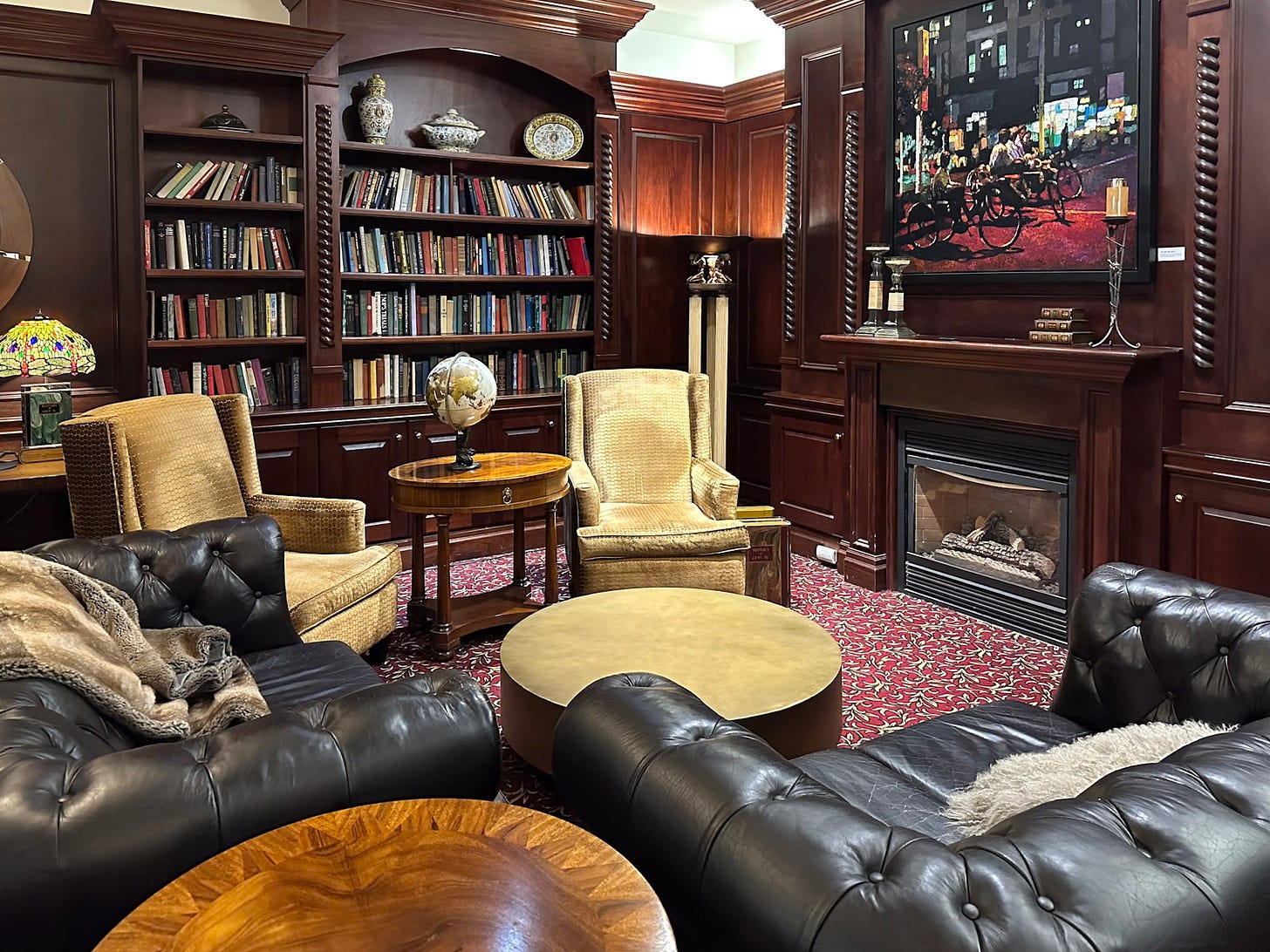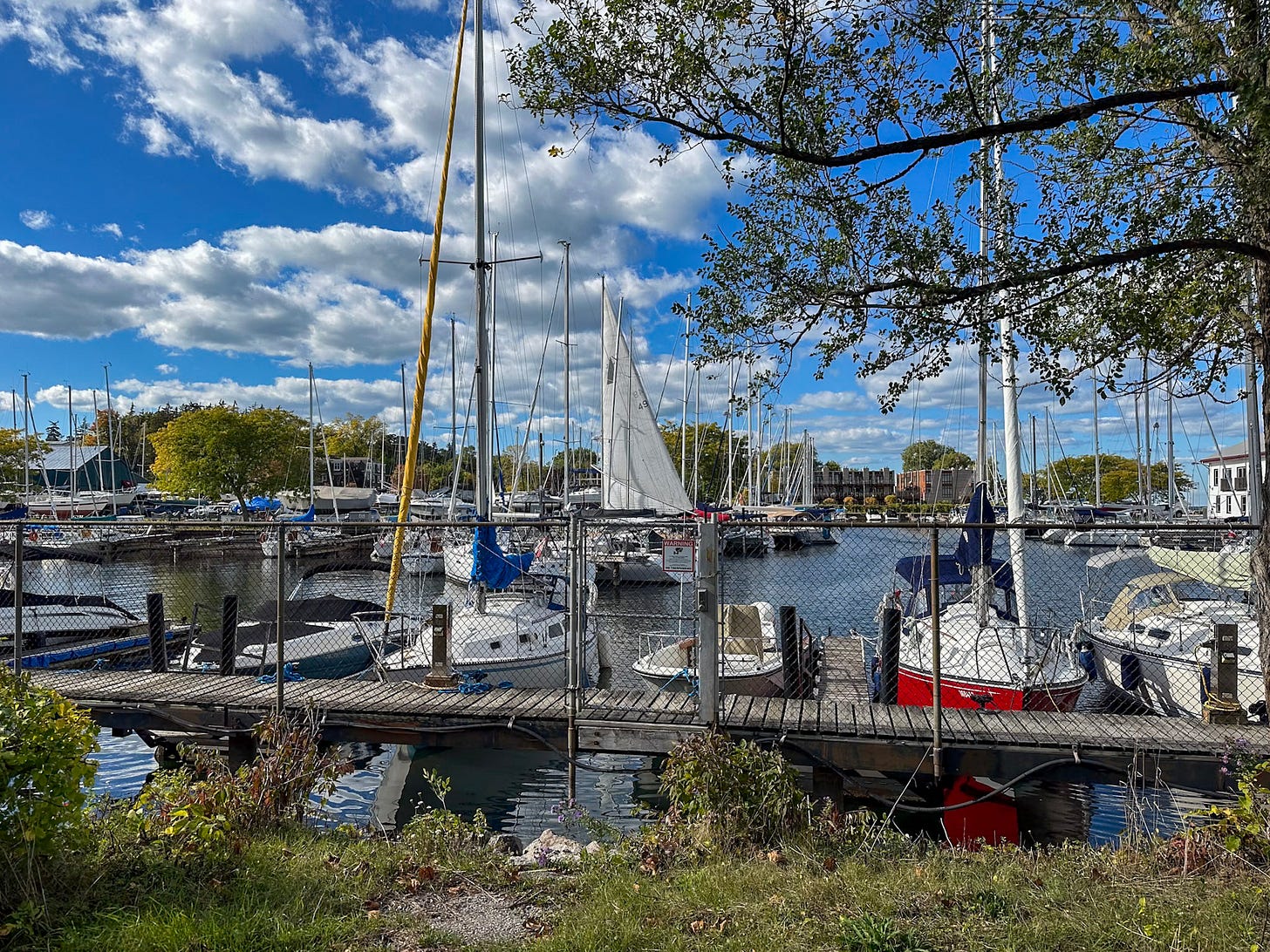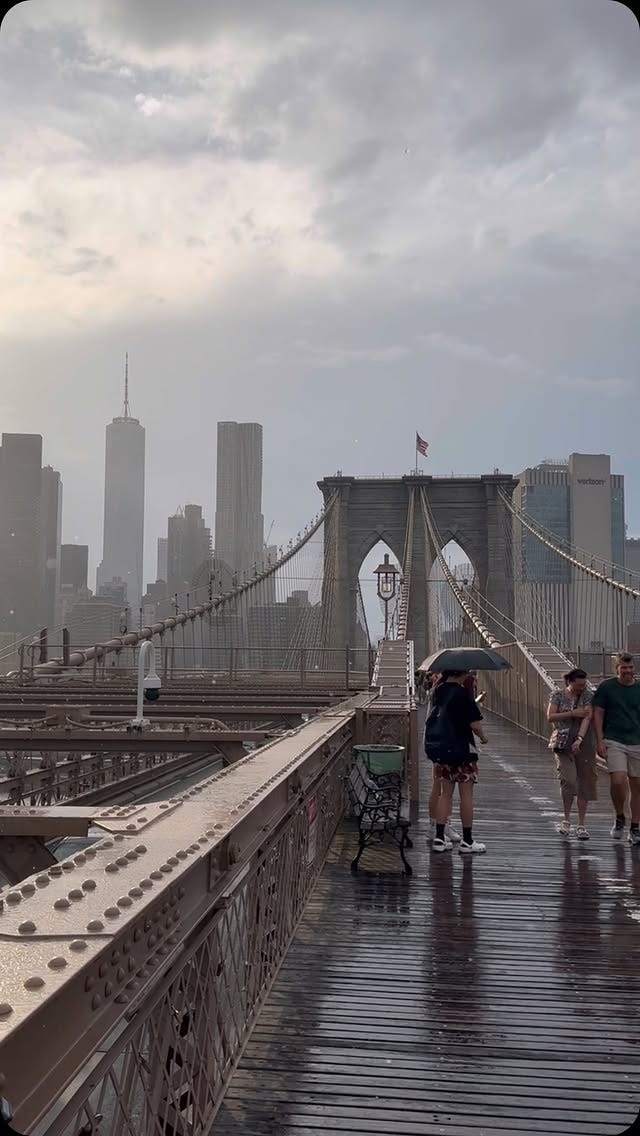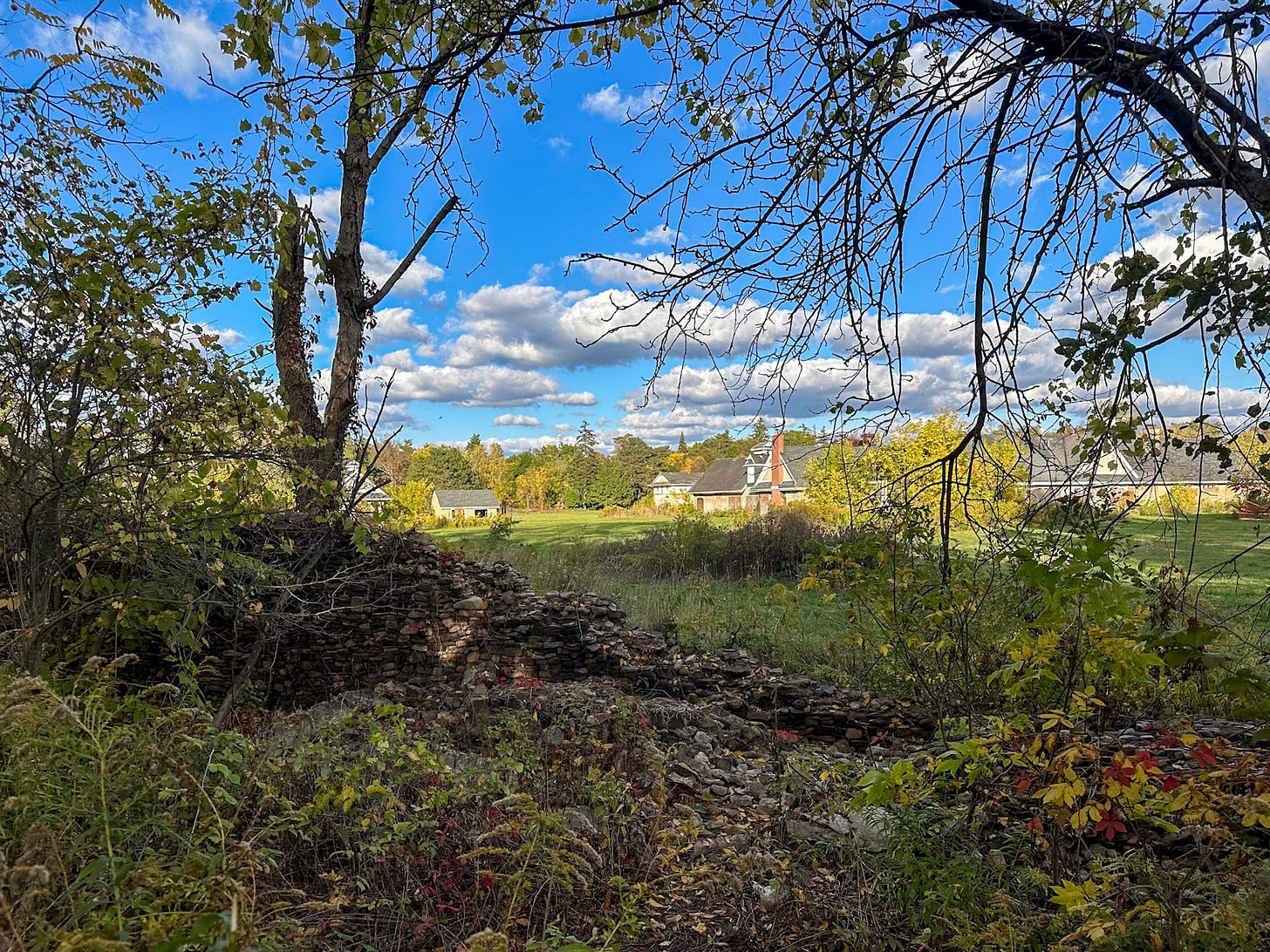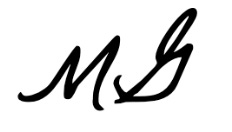The 4 Levels of Trust
From the personal to political

Greetings from Niagara on the Lake!
The early days of this week were absurdly warm for the first days of October. Well into the evening, it felt like July. The air had the quality of Tampa or the Carolinas, which is to say - moist and excellent.
Even now, as the sunrises and the storm comes to break the heat, I’m in short-sleeves, sipping a double espresso at the local Balzacs. It may not have been my first choice but it’s in a lovely historic building, it opened the earliest, and I’m at a window perch looking out at King Street, as the town wakes up (rather slowly which I’m gathering is it’s nature).
The young table of two, seemingly on the most rare of first dates - 7:00am (it’s going okay but not great). The older couple that I would bet my aunt has been doing this morning walk routine for years. The German speaking gentlemen who was pleasantly shocked when one of the baristas made casual conversation over the expresso machine in his native tongue. Wie schön! And the man who rather miraculously made the power come back on, after a short outage, so he could acquire his cortado. Our very own caffeine-Jesus.
My wife made the observation that Niagara-on-the-Lake is a larger, freshwater St. Andrews-by-the-Sea - our Maritime summer haunt. Last week I happened to be in our St. Andrews local, writing the opening words of this essay, expecting to get it out before travelling.
Here’s what I said:
Honeybeans is a particularly interesting place, full of particularly interesting people. It’s nearly October and so that means many have already left. Water Street feels particularly sleepy, yet pleasant, at 7:30am and I’m one of the few locals at the coffeehouse. Those who remain are my kind of people. I don’t know what I mean by that exactly, but I do know I mean it.
That’s the same way I think of trust at the culture level - you know it when you see it.
That’s our topic today.
I’ve recently finished a four-part series1, based on Chris Arnade’s How to Build the Perfect City - and much of it centred on the idea of regulation vs. trust and what it means for how a culture and economy develops over time.
The central questions being - can you actually plan a place? Does policy change culture? Is culture path dependent? What are the responsibilities of those who make the rules and are the rules best written top-down or bottom-up?
As often happens, I naturally gravitate back to my bookshelf and pick up something that feels like important material on whatever I’m writing about. In this instance - Michael Lewis’ Boomerang.
It proved to be a very good decision, because the preface (maybe the perfect preface) deals entirely with the immediate aftermath of the 2008 financial crisis - one rooted squarely in the erosion of trust at the culture level.
Michael sets off to ‘…the new third world’ to try and understand just how these things happened where they happened - something I am keenly interested in. To Greece, where trust at the political and economic level was eroded to near-zero. To Ireland, where the mass-delusion of building as much as they could possibly build led to a dramatic change in Ireland’s culture - defined by who stayed, who arrived, and who left her. Direct evidence that of course the built world impacts the culture, and can even change it. To Germany - the pragmatic Germans! - who had never encountered such a species as the American finance guy and so were completely duped.
Today - an attempt to actually define trust at all 4 levels - including the culture level, and how the landscape of cultural trust seems to be hanging on by a thread.
Please enjoy, and thank you for reading.
““What happened was that everyone in Ireland had the idea that somewhere in Ireland there was a little wise old man who was in charge of the money, and this was the first time they’d ever seen this little man,” says McCarthy. “And then they saw him and said, Who the fuck was that? Is that the fucking guy who is in charge of the money? That’s when everyone panicked.”” - Michael Lewis
Trust All the Way Down
Trust at the personal level might be best described as a relationship to higher forces. It can’t be proven to you, and it won’t be driven by our modern love (obsession) with data. It will be a felt experience and relies on us believing that there is something more important than ourselves out there that is worth working toward, and worth being in relationship with, on a daily basis.
Consistency seems to be the key. That relationship takes constant work, and is easy to lose.
A sense of purpose doesn’t come from thinking about it. It comes from taking action that moves you toward the future. The moment you do this, you activate a force....We call this the “Force of Forward Motion. - Phil Stutz
We might say trust as the personal level is a form of discipline. We go out into the world and act in a way that aligns with our values, because we think it’s good to do so. That we ought to do so. If we have the correct discipline - if we’re in right relationship - then the reward for our discipline is a sense of freedom that can only come from commitment to a greater cultural story - not the perverse church of the individual.
Trust between individuals - or small groups - is about the daily agreements we make to one another, over a long enough period of time that productive and worthwhile relationships can form. It’s the product of hundreds-of-thousands of years of small group human evolution, not the performative pleasantries that so often make up rich countries, like mine, at the moment. It’s something much deeper and much more important - something people like the French seem to understand in a more mature way.
In France, the context is different. Relationships are built more slowly, and warmth carries weight precisely because it isn’t given out automatically. A smile offered too freely risks being read as superficial or false. Intimacy is earned over time, through consistency and loyalty, not through instant charm. - Pamela Clapp
We don’t want to believe usness matters anymore, but it does matter, and it’s becoming increasingly hard for people - especially young people - to come to a reasonable conclusion around exactly what that means.
It’s so important that folks who believe the better angels of our nature theory would tell you we’ve only been able to build what we’ve built because we’ve found a way to make these agreements, and assume the best in others. This allows us to collaborate, at scale. It’s the social and economic coincidence of wants and so we trade, and share public spaces, and build companies, and start community groups.
Each time I ramble into New York City by train, I’m struck by this exact phenomenon. By all measures of account - this should not work. How does it work? What about the plumbing? It makes absolutely no sense and if you were a betting man you’d think it would devolve into madness because of it’s sheer scale. But it doesn’t. In fact, it really doesn’t. If success is a melting pot that still retains a sense of usness, then New York City has done a seemingly exceptional job at maintaining that, in spite of it being the whole world in a single city. The global cache of I ❤️ NYC brand alone makes me think it might have done the single best job of any city, anywhere.
What if we stop being able to do that? What if we can no longer agree on anything at all because the screens have superseded the streets in cultural value and in time spent. Culturally I wish we could detach ourselves from the drug of TOS - Time On Site - in favour of TIS - Time in the Streets.
Trust at the culture (big groups) and built level (planning and politics) are both far harder to define, and far more difficult to get right.
Let’s start with the idea that culture is not politics, even though that’s how we govern ourselves. Culture is the sum total of how we behave and interact at the big group level - it’s how we define ourselves, not how we rule ourselves.
That’s why obsession with politics at the international level seems to makes folks so miserable. Because we can’t actually do anything about it and in our anxious misery we often end up forsaking our own community (the thing we can very much impact indeed) for an obsession with drama, pop-culture, and international affairs.
Thought experiment: How much time have we spent talking about the current American administration vs. time spent holding our local city council accountable? Time spent on daily mindfulness and fitness? Deliberate, please-God-phones-away time in conversation with our spouses? I’m as guilty here as anyone, although I am working on creating a discipline that re-balances the scales.
Perhaps the central question of our time - alongside birthrate2 - is how to build productive cultures in a hyper-diverse world, where those with the means to do so can go anywhere they please and invest anywhere they like. That will be a major focus of the newsletter for the foreseeable future because figuring that out seems to be critical - and we better get on it because it isn’t - you may have noticed - going well.
Our cultural contexts can be so very different - even if we like to pretend that they are not (it’s mostly folks who haven’t travelled who perpetuate this charade). We’re bound by our own lives, and our own places that have long histories. As much as we try to shed where we come from and who we are, in favour of a more worldly approach to a very globalized world, we live our lives and they live their lives and that’s just the facts of it all. If you hadn’t noticed - time only goes one way and you’re on this ride forever pal.
Trust at the culture level might be defined as the sum total of all the agreements we make.
We make daily agreements - like pulling over for an ambulance, whose temporary passenger has more important places to be than you do. And we make longer-term agreements like what kind of country we want to be and how we want to behave in public. This matters far more than we’d like to believe, and the rate at which these long-term agreements are decaying in my hometown, for example, would alarm the statisticians.
We might deferral of local responsibility as a cultural red flag. Is it our responsibility to pickup the trash that litters our urban streets or is it their job? The problem here is obvious when you think it through. As Kevin Kelly might say - trust me - there is no ‘they.’
Cultural trust is even more important than trust at the built level (politics and planning) because most people don’t participate in those things, but everyone lives an average day, every day and we have to find a way to get on with it as best we can. And - if I haven’t said this enough - the built level will never be good enough to unite and bind us because we need to make agreements to each other that are not rules made under threat of punishment if you break them.
I don’t underestimate the built level and it’s impact on culture - how big groups of people interact, how we build a place physically, and how we make the rules for ourselves - but you know by now that I simply do not believe it is going to be what fixes us. In fact, it’s obvious that it can’t and won’t because after we make all of our good policies and new rules, we will still be stuck with each other. There’s nowhere else to go.
I can’t get past the idea that trust at the culture level erodes completely if discipline and meaning erodes at the personal level. We can blame whatever we want, and yet we can never seem to escape ourselves.
Corporate greed? A large group of humans.
Lethargic government bodies? A large group of humans.
Social media companies hiring the best and brightest of a generation to make us hopelessly addicted screen demons? A large group of humans.
Big-Pharma or Big-Food - two groups that I firmly believe make us more sick than well (even-though I’ve experienced the modern acute-sick-care miracle personally) = yet again - a large group of humans.
We can’t escape ourselves. We will never be able to. There ain’t nowhere to go, as much as we might try metaphorically and literally to go to Mars. I’ve always found it intriguingly bizarre that we’d like to leave the only planet where we know organic life is possible and flourishing. We have really advanced telescopes and we can see a lot of things, and - trust me - this is the good place.
Perhaps it’s a claustrophobia driven by how seemingly small the world has become, and how uneasy we feel about our new public life. To restore that trust - at every level - we need to exercise a personal discipline, connect with individuals to find common ground, participate at the built level where we can directly have influence, and - perhaps - spend a little less time on social media.
See you in the streets!
—
All we need is a point of view, a set of tools, and a lot of time.
See you on the road.
“In Italy the staff cared because they were either the owners or employees who had been there for decades, and this was their life, and they saw it as a craft more than a job, and because Italians see breakfast as something more than a momentary transaction meant to get you in and out as efficiently as possible, before you run off to do your next thing.” - Chris Arnade
Start here and work your way to the present.
Pay attention to this going forward. This will be perhaps the defining story of our times, and the rate at which it came shocked everyone - including the Chinese.


